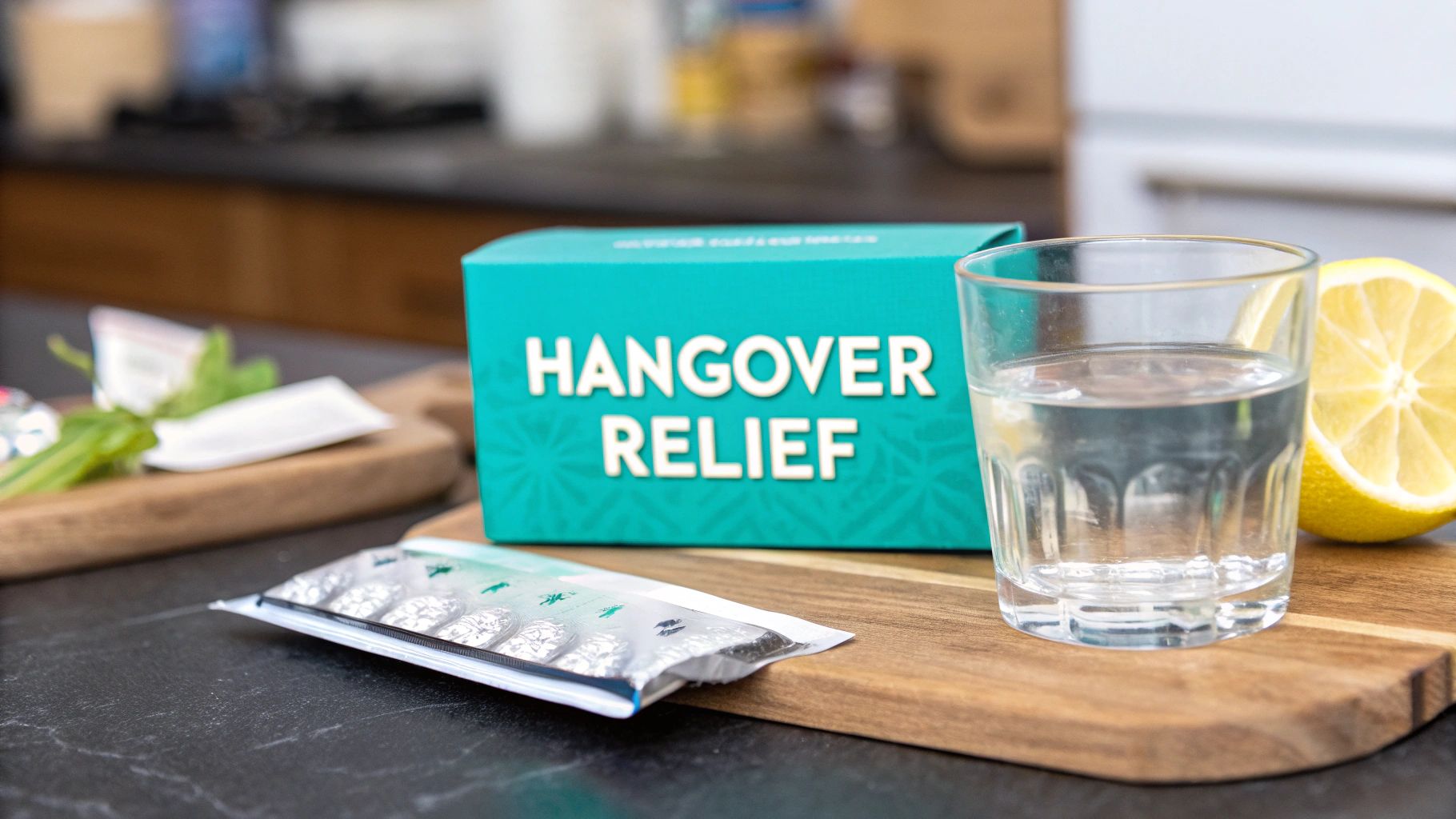

· By Annemarie
How to Help a Hangover A Practical Guide
Most people think the fight against a hangover starts the morning after, with a big glass of water and a prayer. The real secret? It actually begins before you even have your first drink.
If you’re proactive about hydrating and eating the right kind of meal, you can seriously lessen the blow of the next day's misery by slowing down alcohol absorption and just generally giving your body a fighting chance.
Your Hangover Recovery Starts Before You Drink
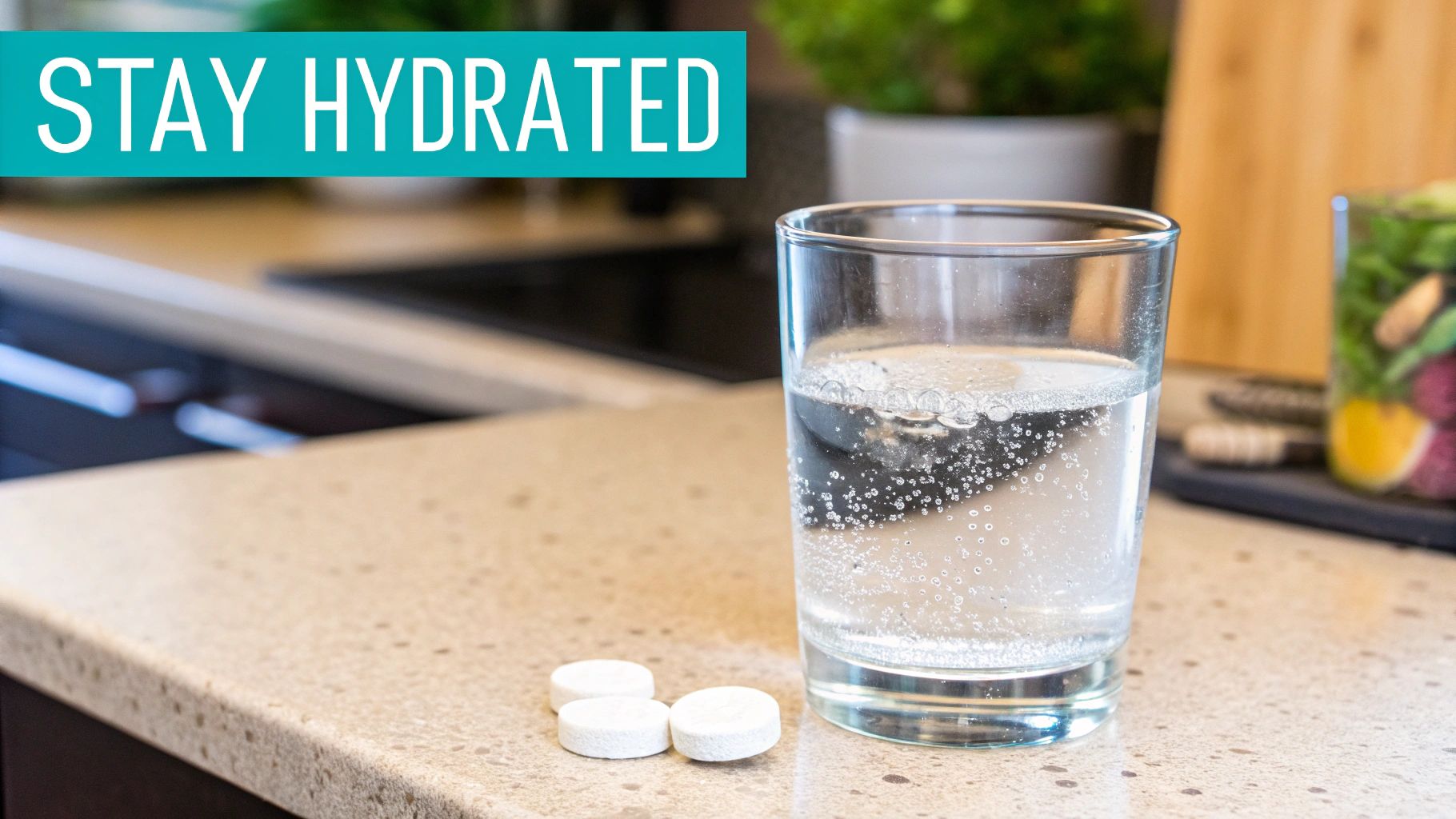
Seriously, the most effective game plan happens hours before you even think about ordering that first round. Think of it as building a fortress for your body. The whole point is to fortify your system, slow the rate alcohol hits your bloodstream, and stock up on the resources your body needs to process everything.
Fuel Your Body the Right Way
Showing up to a party on an empty stomach is basically asking for a world of hurt the next morning. Food acts as a crucial buffer, but not just any food will cut it. You need a solid, balanced meal that gives you sustained energy and some real protection.
Try to build a meal around these key components:
- Healthy Fats: Think avocado, nuts, or salmon. These help line your stomach, which is a game-changer for slowing down how quickly that alcohol gets absorbed.
- Lean Proteins: Chicken, fish, or tofu are your friends here. They provide the amino acids your liver needs to do its job of metabolizing everything you’re about to drink.
- Complex Carbohydrates: Things like sweet potatoes or brown rice give you that slow, steady release of energy, which helps keep your blood sugar from going on a rollercoaster.
A perfect pre-gaming meal could be something like grilled chicken with a side of quinoa and a few slices of avocado. It checks all the boxes and sets a solid foundation for the night ahead.
Key Takeaway: I can't say it enough: never drink on an empty stomach. A proper meal with fats, proteins, and carbs is your first—and strongest—line of defense against a killer hangover.
Hydration Is More Than Just Water
Getting ahead on hydration is just as important. We all know alcohol is a diuretic (it makes you pee more), which leads straight to dehydration. That’s where those killer headaches and dizzy spells come from. Start chugging water well before you head out for the night.
Aim to drink plenty of water all day, but you can also level up by throwing in an electrolyte-rich drink. A little coconut water or a sports drink can top off your mineral levels before they get zapped. It’s a simple move that gives your body a hydration reserve to pull from.
If you want even more tips on getting your body ready, check out our full guide on how to prevent a hangover before drinking.
It’s pretty clear people are looking for better ways to handle the morning after. The global market for hangover cure products was valued at a whopping USD 2.34 billion in 2023 and is projected to hit USD 6.18 billion by 2030. That kind of growth shows that more and more of us are wising up to products that can help our bodies recover. This proactive mindset is exactly what will set you up for a much, much better morning.
Making Smarter Choices While You Socialize
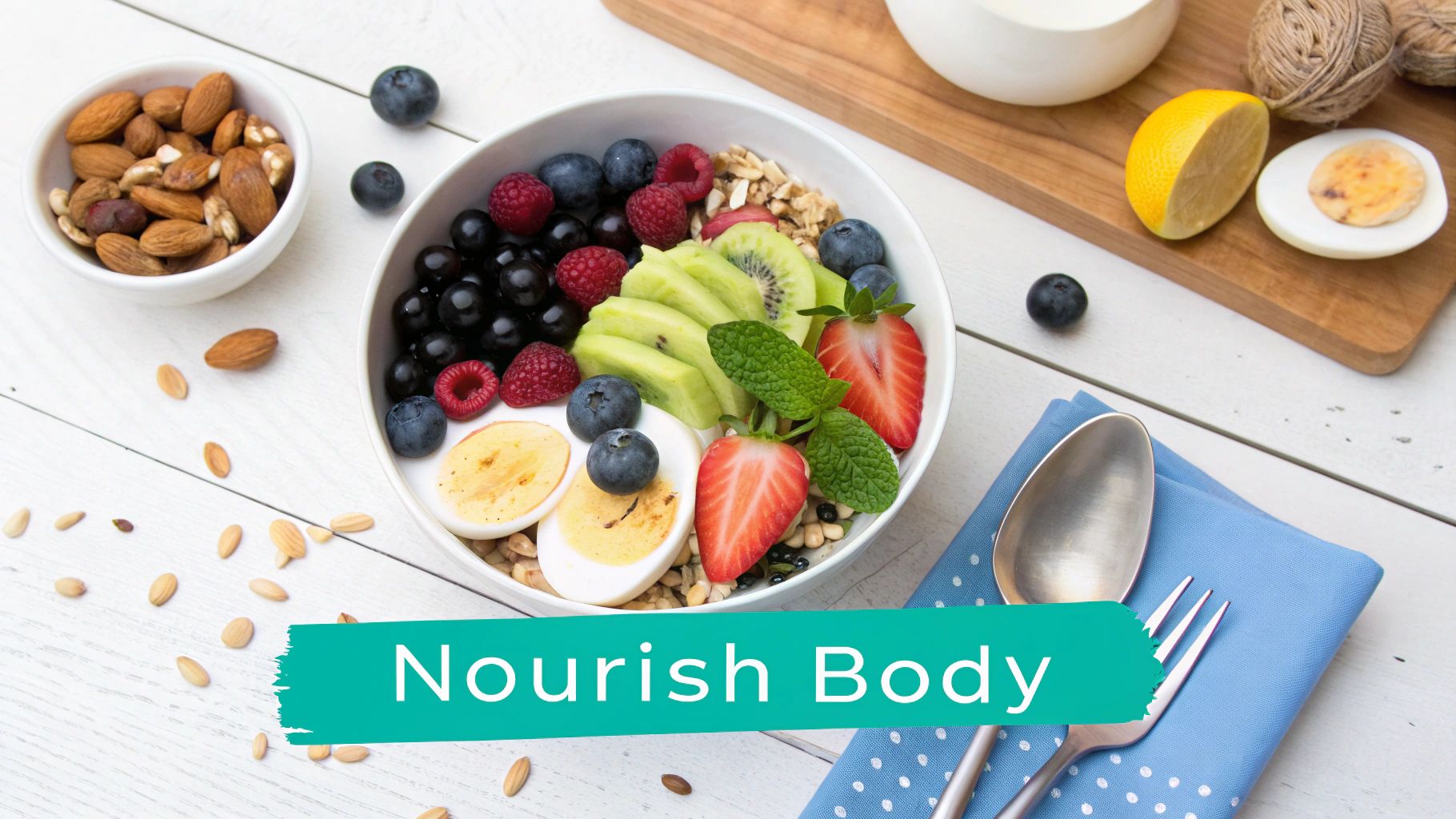
The choices you make with a drink in your hand have a direct ripple effect on how you feel the next day. Beyond the obvious advice to "drink less," there are strategic moves you can make in the moment to significantly soften the landing. Knowing how to help a hangover starts with managing the night itself.
A great place to start is the "one-for-one" rule. For every alcoholic beverage you have, follow it up with a full glass of water.
This simple habit tackles dehydration head-on, which is a primary driver of that dreaded morning-after headache and fatigue. It's an easy rhythm to get into—order your cocktail, but ask for a water on the side. Finish your drink, then finish your water before even thinking about the next round. This not only keeps you hydrated but also naturally paces your drinking throughout the night.
Decode Your Drink Order
What you drink matters just as much as how much you drink. Ever wonder why some drinks hit harder than others? The culprit often comes down to compounds called congeners.
Congeners are byproducts of the fermentation and aging process, giving many dark liquors their distinct color and flavor. Unfortunately, they're also notorious for making hangovers more severe. Drinks high in congeners include:
- Bourbon
- Dark rum
- Whiskey
- Red wine
When you can, opt for clearer spirits. Vodka, gin, and white rum contain far fewer congeners, which can lead to a noticeably less intense hangover. It’s a simple swap that can make a world of difference.
When ordering at the bar, a vodka soda with a lime is a much smarter choice than a rum and coke. You're avoiding both the high-congener dark liquor and the excessive sugar from the soda, tackling two major hangover triggers in one go.
Sidestep Sugary Mixers and Pace Yourself
Speaking of mixers, sugar is another hidden enemy. Sugary cocktails can cause your blood sugar to spike and then crash, which just adds to feelings of fatigue and weakness the next day. They also tend to mask the taste of alcohol, making it dangerously easy to drink more than you intended.
Beyond your drink choice, pacing is everything. Your liver can only metabolize so much alcohol at once. A good rule of thumb is to stick to no more than one standard drink per hour. This gives your body a fighting chance to process the alcohol and prevents a toxic buildup of acetaldehyde—the nasty compound behind symptoms like nausea and facial flushing.
This doesn't mean you have to sit out the fun. By alternating with water, choosing clearer spirits, and keeping an eye on your pace, you're actively working to help your future self avoid a miserable hangover. It’s about being mindful without sacrificing the social experience.
Your Morning After Action Plan for Fast Relief
The moment your eyes crack open, you know. That pounding head, the churning stomach, the bone-deep fatigue—it's your body sending out a major S.O.S. What you do in these first few hours can make or break the rest of your day, and knowing how to handle a hangover starts with a focused, gentle approach.
Rehydrate and Replenish
First things first: hydration. But don't just chug a gallon of plain water and call it a day. Alcohol is a diuretic, which is a fancy way of saying it makes you pee out not just water but also essential minerals called electrolytes. This imbalance is a huge reason you feel dizzy and your head is throbbing.
To really get back on track, you need to restore both fluids and those lost electrolytes.
- Electrolyte Drinks: A low-sugar sports drink, some coconut water, or even an electrolyte powder mixed into water will get your sodium and potassium levels back up way faster than water alone.
- Upside Hangover Sticks: This is where a targeted approach really shines. Products like Upside Hangover Sticks are specifically designed for rapid absorption, delivering a precise blend of electrolytes and other recovery-boosters to help you feel human again, fast.
There's a reason the hangover rehydration market is booming. Valued at around USD 1.1 billion in 2025, it's expected to hit nearly USD 3.8 billion by 2035. People are catching on to the fact that targeted rehydration just works better.
Gentle Fuel for Your Stomach
Your blood sugar has probably cratered overnight, which is why you feel so weak and shaky. Eating might be the absolute last thing you want to do, but getting some easy-to-digest calories into your system is non-negotiable.
Now is not the time for a greasy fry-up, which can just make your stomach angrier. Think simple. Bananas are amazing for replenishing potassium, and a piece of toast or a few crackers can help stabilize your blood sugar without causing a scene.
I see this all the time—people reach for a massive, greasy breakfast thinking it’s the ultimate cure. More often than not, it just makes the nausea worse. Start with something bland like toast and a banana, see how you feel, and then maybe think about a bigger meal.
Need a few more ideas? We've got you covered in our article on 7 quick remedies for a fast hangover cure.
Managing the Headache
That relentless headache needs attention, but be smart about what you grab from the medicine cabinet. Many common pain relievers can be tough on your liver, which is already putting in overtime to process all the byproducts from last night.
Sometimes, the best medicine isn't a pill at all. Creating a calm, restful environment is a huge part of headache relief.
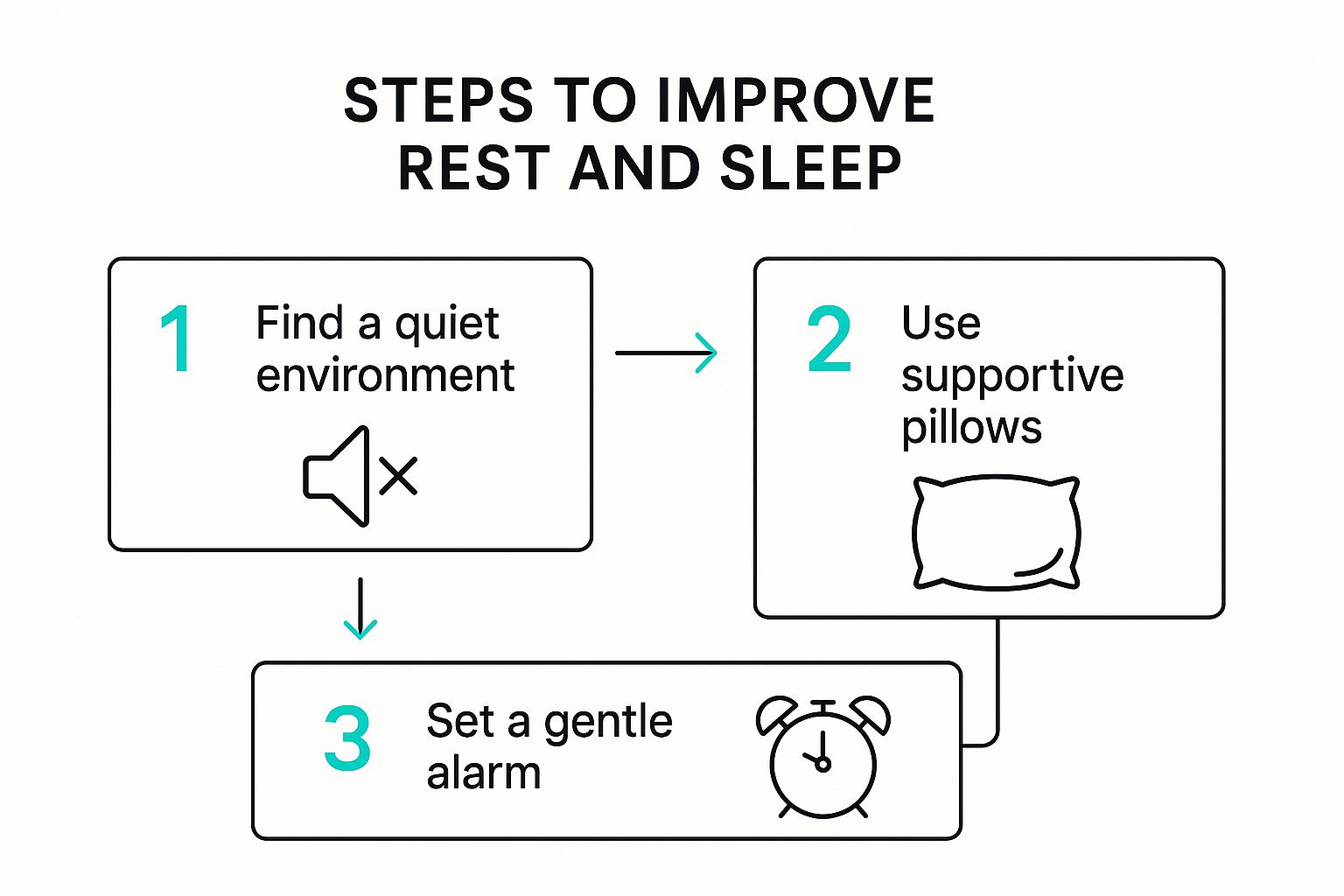
When you pull the curtains, turn off the noise, and just rest, you give your brain a fighting chance to recover without being bombarded by extra stimulation.
Feeling overwhelmed? Here's a quick checklist to get you started.
Your Morning After Recovery Checklist
This simple table is your quick-start guide. Focus on these three things in the first couple of hours after you wake up to get the ball rolling on your recovery.
| Priority | Action | Why It Helps |
|---|---|---|
| 1 | Hydrate with Electrolytes | Restores fluid balance and minerals lost from alcohol's diuretic effect. |
| 2 | Eat Something Bland (Toast, Banana, Crackers) | Stabilizes low blood sugar to combat weakness and fatigue without upsetting your stomach. |
| 3 | Rest in a Quiet, Dark Room | Reduces sensory overload, allowing your brain and body to rest and recover. |
Tackling these priorities first sets you up for a much faster turnaround. Don't try to do too much at once—just be gentle with yourself and focus on giving your body what it needs.
Nourishing Your Body for All-Day Recovery
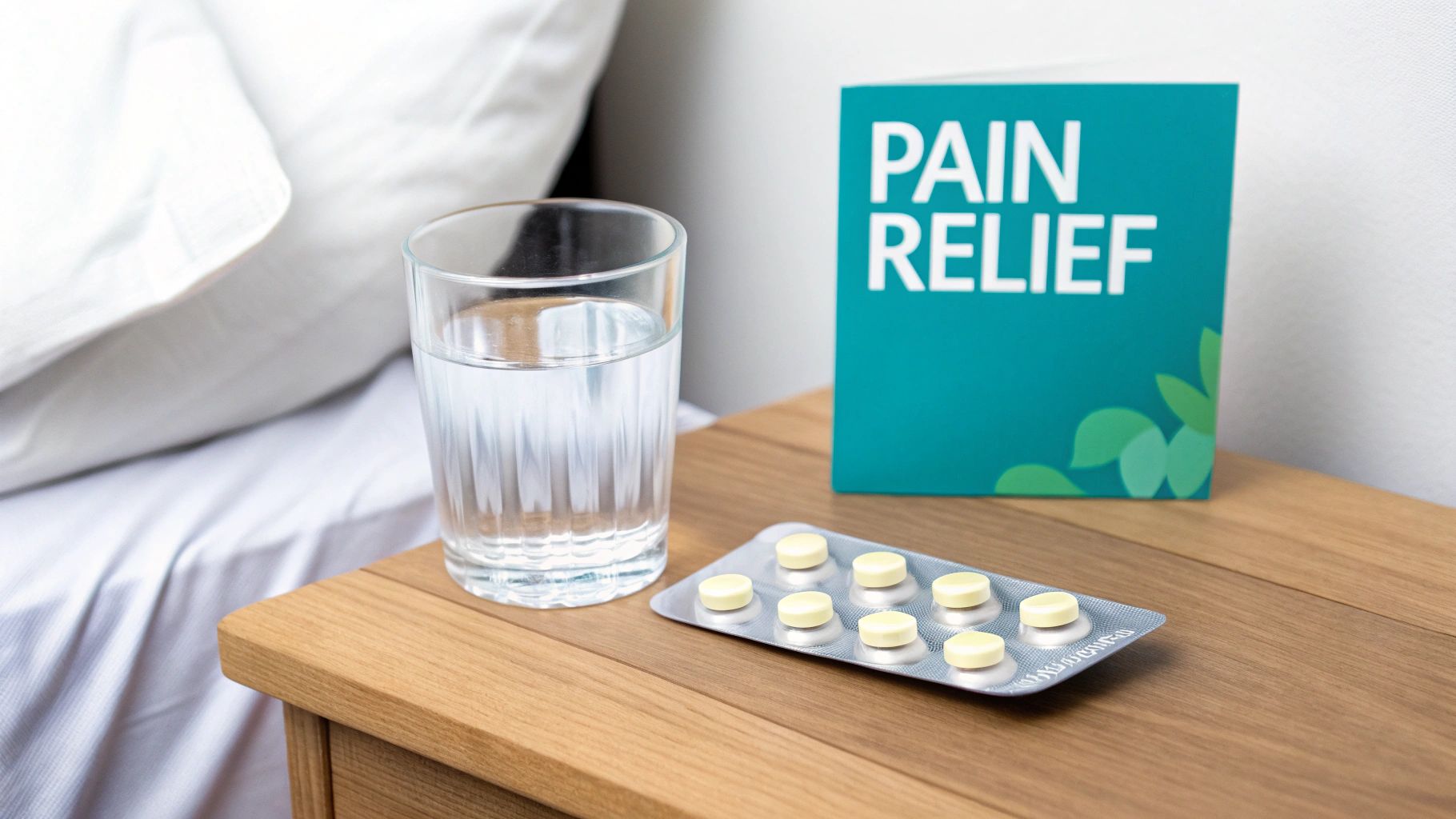
Okay, you survived the morning. That’s a solid win, but the battle isn't over just yet. A full hangover recovery is more of a marathon than a sprint, and what you eat and do for the rest of the day matters just as much as those first few hours.
Your goal now is to keep nourishing your body with the right fuel so it can heal and process any of those lingering toxins. After you've handled the initial crisis with hydration and maybe a light snack, your body is crying out for some real nutrients. Alcohol has a nasty habit of depleting essential vitamins and minerals, so it’s your job to restock the shelves.
Building Your Recovery Menu
First things first: forget the old myth that a greasy burger and fries will "soak up" the alcohol. In reality, heavy, fatty foods can make a sensitive stomach feel way worse and put extra stress on your already overworked liver. Think clean, simple, and powerful instead.
Your body is especially low on B vitamins and amino acids after a night of drinking. Here are a few superfoods that deliver exactly what you need:
- Eggs: A true hangover hero. Eggs are packed with cysteine, an amino acid that helps your body break down acetaldehyde—that's the nasty compound responsible for most of your hangover misery.
- Avocado: This amazing fruit is loaded with potassium, an electrolyte you lose big time when you drink. A few slices on toast is an easy way to get your levels back up.
- Bananas: Another potassium powerhouse. They're also super easy to digest and can help stabilize your blood sugar without a major crash.
- Oats: A warm bowl of oatmeal is comfort food for a reason. It provides a steady release of energy and contains B vitamins, calcium, and magnesium, all of which get zapped by alcohol.
If you want a deeper dive, you can learn more about what to eat when hungover with our list of the 8 best foods for 2025.
Debunking Common Hangover Myths
When you're desperate for relief, it’s easy to fall for some popular "cures," but a lot of common advice can do more harm than good.
The two biggest myths are the "hair of the dog" and the greasy food binge. Honestly, having another drink just postpones the inevitable crash and is incredibly hard on your liver. And that greasy food? It often just irritates an already inflamed stomach lining, delaying your recovery.
Stick to nutrient-dense, easily digestible foods. A simple lunch like chicken soup or a smoothie with spinach and banana can continue the healing process your body desperately needs.
Incorporate Gentle Movement
I know, the thought of exercise might make you cringe right now. But a little bit of light activity can work wonders. I'm not talking about hitting the gym for an intense workout—that will only dehydrate you further.
A gentle walk outside is the perfect solution. It gets your blood flowing, which helps your body process toxins more efficiently. Plus, the fresh air and sunlight can give your mood a much-needed lift, helping to shake off that lingering brain fog. It's a simple, low-effort step that can accelerate your journey back to 100%.
Using Upside to Speed Up Your Recovery
Even with all the best prep and mindful drinking, sometimes you still need an extra boost to get back on your feet. This is where a targeted recovery tool can make a world of difference, helping your body bounce back way more efficiently.
Instead of playing a guessing game with different vitamins and powders, products like Upside Hangover Sticks are built with a science-backed formula. They're designed specifically to tackle the deficits alcohol leaves behind.
It’s not a magic wand, but think of it as a highly effective support system for your body. Your system is already working overtime to process the booze, rebalance electrolytes, and fight off inflammation. A specialized recovery stick just gives it the exact tools it needs to get the job done faster and better.
How to Use Upside for Maximum Impact
Getting the timing right is everything. With a product like Upside, the strategy is simple and designed to work with your body’s natural recovery process, not against it. The idea is to give your body support before the worst of it hits and again when you need it most.
Here’s the simple, two-step approach that works wonders:
- Before Bed: Take one stick after your last drink, right before you hit the hay. This gives your body a head start, feeding it essential vitamins and minerals to kick off the recovery process while you sleep.
- Upon Waking: Take a second stick first thing in the morning. This is your second line of defense to tackle any lingering grogginess, replenish what was lost overnight, and give you a real boost to face the day.
This easy routine helps you get ahead of the recovery curve. And it's an approach that's catching on—fueling a global hangover cure market projected to grow from USD 2.94 billion in 2025 to a massive USD 5.16 billion by 2032. You can see how consumer habits are shifting in this growing market trend.
Pro Tip: Keep a few Upside sticks in your bag or on your nightstand. When they’re right there, you’re way more likely to stick to the plan, even when you're exhausted and just want to crash.
What Makes It Work
So, what’s the secret sauce? Upside’s effectiveness is all about its smart blend of ingredients that target the main culprits behind hangover symptoms. It’s not just about chugging water; it’s a multi-pronged attack on that next-day misery.
- Electrolytes to fight off dehydration and get your mineral balance back on track.
- Vitamins (like B-complex) to support your liver and restock the nutrients alcohol depletes.
- Antioxidants to help neutralize the nasty free radicals produced when your body breaks down alcohol.
By packing these into an easy-to-use stick, you’re giving your body a concentrated dose of everything it’s craving to fight fatigue, headaches, and that general "ugh" feeling. It’s a smart, convenient way to round out your recovery plan.
Common Hangover Questions, Finally Answered
Even when you feel like you know the hangover basics, there are always a few nagging questions that pop up. Let's clear the air and tackle some of the biggest myths and curiosities out there. It’s time to separate fact from fiction so you can make smarter choices for your body.
Do Darker Alcohols Really Give You Worse Hangovers?
You've probably heard it a million times: stick to clear liquor if you don't want a brutal morning. Turns out, this isn't just an old wives' tale—there's some real science behind it. The main culprits are chemical byproducts from fermentation and aging called congeners.
These compounds are what give dark spirits like whiskey, bourbon, and dark rum their rich color and complex flavors. The downside? They’re also notoriously hard for your body to process and have been linked to more severe hangover symptoms.
Clear spirits like vodka, gin, and white rum have way fewer congeners, which often means a less intense next-day experience. Now, drinking too much of anything will still leave you hurting, but choosing clearer options can genuinely make a difference.
Why Do Hangovers Get So Much Worse With Age?
It’s not in your head—hangovers really do feel more punishing as you get older. A few things are going on here.
As we age, our body composition changes. We tend to lose muscle mass and gain body fat, which completely changes how we metabolize alcohol. On top of that, our liver's efficiency can take a nosedive, meaning it takes much longer to process alcohol and its toxic byproducts, like acetaldehyde. This lets all those nasty compounds hang around in your system, dragging out the misery.
You might have bounced back from anything in your early twenties, but your body's recovery systems just aren't as robust a decade later. This is why proactive steps—like serious hydration and using recovery aids—become non-negotiable.
Should I Try to Sweat It Out at the Gym?
The idea of "sweating out" last night's toxins is a classic myth, but it can do way more harm than good. When you're hungover, your body is already seriously dehydrated. Hitting the gym for an intense workout will only make that dehydration worse, leading to potential dizziness, a racing heart, and an even more painful headache.
Your body gets rid of a tiny fraction of alcohol through sweat—less than 1%, in fact. Your liver does pretty much all the heavy lifting. Instead of a punishing gym session, opt for a gentle walk. A little light movement can boost your mood and get your circulation going without draining your body's precious fluid reserves.
What About Folk Remedies Like Pickle Juice?
From a greasy breakfast to the infamous "hair of the dog," everyone has their go-to folk remedy. While most are pretty ineffective, some, like drinking pickle juice, actually have a grain of scientific truth to them.
Pickle juice is loaded with sodium and potassium, two key electrolytes you lose a ton of when you drink. A small swig can help you rehydrate more effectively than just water alone. But let's be real, it's not a magic cure. It only addresses one piece of the puzzle—dehydration—and does little for the headache, nausea, or inflammation caused by everything else alcohol does to your body.
At the end of the day, the best game plan is a multi-faceted one that supports your body's entire recovery process, from hydration to nutrient replenishment.
For a targeted, all-in-one approach that supports your body's natural recovery from every angle, consider Upside Hangover Sticks. They provide the electrolytes, vitamins, and antioxidants your body is craving to bounce back faster. Check them out at https://enjoyupside.com.
